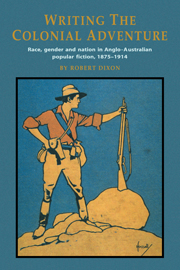 Writing the Colonial Adventure
Writing the Colonial Adventure Book contents
- Frontmatter
- Contents
- List of Illustrations
- Acknowledgements
- Introduction
- 1 The Romance of Property: Rolf Boldrewood and Walter Scott
- 2 Outlaws and Lawmakers: Boldrewood, Praed and the ethics of adventure
- 3 Israel in Egypt: The significance of Australian captivity narratives
- 4 Imperial Romance: King Solomon's Mines and Australian romance
- 5 The New Woman and the Coming Man: Gender and genre in the ‘lost-race’ romance
- 6 The Other World: Rosa Praed's occult fiction
- 7 The Boundaries of Civility: Australia, Asia and the Pacific
- 8 Imagined Invasions: The Lone Hand and narratives of Asiatic invasion
- 9 The Colonial City: Crime fiction and empire
- 10 Beyond Adventure: Louis Becke
- Conclusion
- Notes
- Select Bibliography
- Index
6 - The Other World: Rosa Praed's occult fiction
Published online by Cambridge University Press: 05 November 2011
- Frontmatter
- Contents
- List of Illustrations
- Acknowledgements
- Introduction
- 1 The Romance of Property: Rolf Boldrewood and Walter Scott
- 2 Outlaws and Lawmakers: Boldrewood, Praed and the ethics of adventure
- 3 Israel in Egypt: The significance of Australian captivity narratives
- 4 Imperial Romance: King Solomon's Mines and Australian romance
- 5 The New Woman and the Coming Man: Gender and genre in the ‘lost-race’ romance
- 6 The Other World: Rosa Praed's occult fiction
- 7 The Boundaries of Civility: Australia, Asia and the Pacific
- 8 Imagined Invasions: The Lone Hand and narratives of Asiatic invasion
- 9 The Colonial City: Crime fiction and empire
- 10 Beyond Adventure: Louis Becke
- Conclusion
- Notes
- Select Bibliography
- Index
Summary
As John Seward, the psychiatrist in Bram Stoker's Dracula, struggles to understand in scientific terms the effects of vampirism on the female subject, his colleague, Professor Van Helsing, recommends that he turn to the adjacent discipline of psychic research:
It is the fault of our science that it wants to explain all; and if it explain not, then it says there is nothing to explain. But yet we see around us every day the growth of new beliefs … I suppose now you do not believe in corporeal transference. No? Nor in materialization. No? Nor in astral bodies. No? Nor in the reading of thought. No? Nor in hypnotism?
Van Helsing is trying to convince his colleague that in dealing with irregularities of female behaviour, the science of psychic research has an explanatory power at least equal to those of psychiatry and medicine. What Van Helsing cannot see is that all three discourses played a constitutive and not simply a descriptive role in the proper acquisition of gendered subjectivity. The same may be said of the genre of popular fiction to which Dracula in part belongs: the occult romance.
It is not by chance that Dr Seward and Professor Van Helsing are discussing problems in the regulation of female sexuality, since this was a subject to which writers of occult fiction turned obsessively during the final decades of the nineteenth century.
- Type
- Chapter
- Information
- Writing the Colonial AdventureRace, Gender and Nation in Anglo-Australian Popular Fiction, 1875–1914, pp. 100 - 117Publisher: Cambridge University PressPrint publication year: 1995
